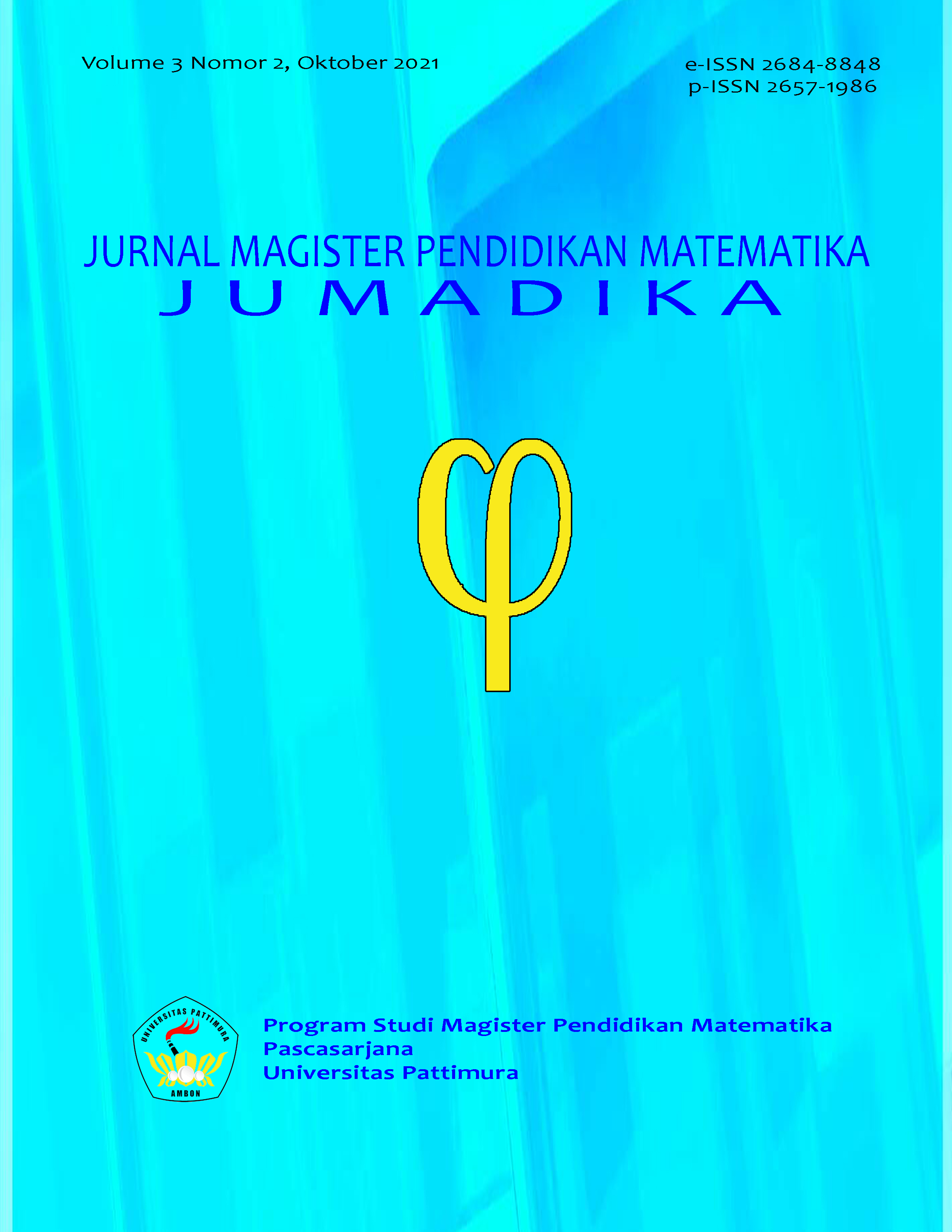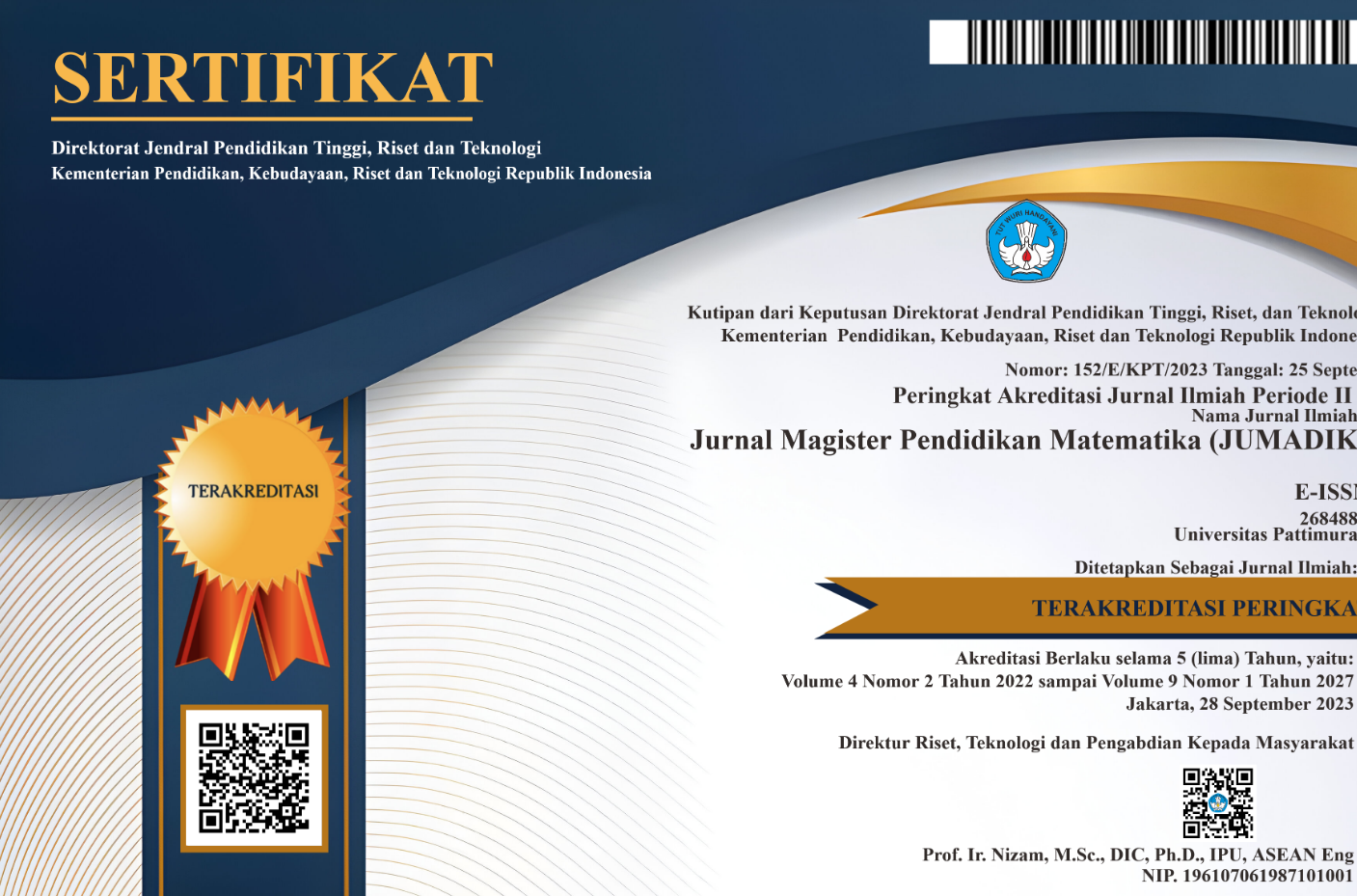EKSPLORASI ETNOMATEMATIKA KONSEP POLA BILANGAN DALAM PERMAINAN TRADISIONAL
Abstract
This study aims to study the relationship between mathematics and culture in Indonesia, one of which is the traditional game of Nasi Goreng Kecap and Mejikuhibiniu. This research is considered important because it teaches students to see real-world activities clearly by being integrated into mathematical ideas. This research uses an ethnographic approach and a library study (literature study) which is a type of qualitative research. The result of this research is that the traditional game Nasi Goreng Kecap and Mejikuhibiniu contains the concept of number patterns, which can be developed in a learning design for number pattern material so that it can change the student's paradigm that mathematics is still considered abstract science to be more fun mathematics
Downloads
References
Abdur Rahman As’ari et al. (2017). Matematika SMP/MTs Kelas VIII Semester 2. Kementrian Pendidikan dan Kebudayaan.
Aprilia, E. D., Trapsilasiwi, D., & Setiawan, T. B. (2019). Etnomatematika Pada Permainan Tradisional Engklek Beserta Alatnya Sebagai Bahan Ajar. 10.
Dahlan, J. A., & Permatasari, R. (2018). Development of Instructional Materials Based On Ethnomathematic in Mathematics Learning in Junior High School. JNPM (Jurnal Nasional Pendidikan Matematika), 2(1), 133–150. https://doi.org/http://dx.doi.org/10.33603/jnpm.v2i1.987
Fahrurrozi, M. (2015). Pembelajaran Berbasis Budaya: Model Inovasi Pembelajaran dan Implementasi Kurikulum Berbasis Kompetensi. In Prosiding Seminar Nasional dan Call For Papers Pendidikan Karakter dalam Pembelajaran Bisnis dan Manajemen.
Leal Vasquez, E. (2017). Ethnomathematics as an Epistemological Booster for investigating Culture and Pedagogical Experience with theYoung Offender orPrison School Communities. Journal of Education and Human Development, 6(1), 117–127. https://doi.org/10.15640/jehd.v6n2a13
Lubis, S. I., Mujib, A., & Siregar, H. (2018). Eksplorasi Etnomatematika pada Alat Musik Gordang Sambilan. Edumatika : Jurnal Riset Pendidikan Matematika, 1(2), 1. https://doi.org/10.32939/ejrpm.v1i2.246
Misnasanti, M., Dien, C. A., & Astuti, A. D. (2018). Internalisasi Nilai Kearifan Lokal Pada Pembelajaran Matematika Di Era Post-Modern. Seminar Nasional Pendidikan …, 158–162. http://seminar.uad.ac.id/index.php/sendikmad/article/view/33
Munawaroh, H. (2017). Pengembangan Model Pembelajaran dengan Permainan Tradisional Engklek Sebagai Sarana Stimulasi Perkembangan Anak Usia Dini. Jurnal Obsesi : Jurnal Pendidikan Anak Usia Dini, 1(2), 86. https://doi.org/10.31004/obsesi.v1i2.19
Nusantara, T., & Rahardjo, S. (2017). Ethnomathematics In Arfak West Papua-Indonesia Numeracy Of Arfak. International Journal of Scientific & Technology Research, 06(09), 325–327.
Prahmana, R. C. (2017). Design Research: (Teori dan Implementasinya: Suatu Pengantar).
Pratiwi, J. W., & Pujiastuti, H. (2020). Eksplorasi Etnomatematika pada Permainan Tradisional Kelereng. Jurnal Pendidikan Matematika Raflesia, 5(2), 1–12. https://ejournal.unib.ac.id/index.php/jpmr/article/view/11405
Rohmatin, T. (2020). Etnomatematika Prmainan Tradisional Congklak Sebagai Teknik Belajar Matematika. Prosiding Konferensi Ilmiah Dasar, 2, 144–150.
Rosikhoh, D., & Abdussakir, A. (2020). Pembelajaran Pola Bilangan melalui Permainan Tradisional Nasi Goreng Kecap. Jurnal Tadris Matematika, 3(1), 43–54. https://doi.org/10.21274/jtm.2020.3.1.43-54
Rusiana, & Nuraeningsih. (2016). Teaching English to Young Learners Through Traditional Games. English Education: Journal of English Teaching and Research, 10(2), 193–200. https://journal.unnes.ac.id/nju/index.php/LC/article/view/5729/4602
Susanti, E. (2020). Eksplorasi Etnomatematika Konsep Operasi Hitung dalam Permainan Tradisional Kempreng. Suska Journal of Mathematics Education, 6(1), 1–8. http://ejournal.uin-suska.ac.id/index.php/SJME/article/view/10025
Tanudirjo, D. A. (2003). Warisan Budaya untuk Semua: Arah Kebijakan Pengelola Warisan Budaya Indonesia di Masa Mendatang. 19–23.
Verner, I., Massarwe, K., & Bshouty, D. (2019). Development of competencies for teaching geometry through an ethnomathematical approach. Journal of Mathematical Behavior, 56(May), 100708. https://doi.org/10.1016/j.jmathb.2019.05.002.
Copyright (c) 2021 Anisa Laela Ramadhina, Citra Septiana, Melinda Pebrianti, Wahidin Wahidin

This work is licensed under a Creative Commons Attribution-NonCommercial-ShareAlike 4.0 International License.
License and Copyright Agreement
In submitting the manuscript to the journal, the authors certify that:
- They are authorized by their co-authors to enter into these arrangements.
- The work described has not been formally published before, except in the form of an abstract or as part of a published lecture, review, thesis, or overlay journal. Please also carefully read Jurnal Magister Pendidikan Matematika (JUMADIKA) Posting Your Article Policy.
- That it is not under consideration for publication elsewhere,
- That its publication has been approved by all the author(s) and by the responsible authorities – tacitly or explicitly – of the institutes where the work has been carried out.
- They secure the right to reproduce any material that has already been published or copyrighted elsewhere.
- They agree to the following license and copyright agreement.
Copyright
Authors who publish with Jurnal Magister Pendidikan Matematika (JUMADIKA) agree to the following terms:
- Authors retain copyright and grant the journal right of first publication with the work simultaneously licensed under a Creative Commons Attribution-NonCommercial-ShareAlike 4.0 International License (http://creativecommons.org/licenses/by-nc-sa/4.0/) that allows others to share the work with an acknowledgment of the work's authorship and initial publication in this journal.
- Authors are able to enter into separate, additional contractual arrangements for the non-exclusive distribution of the journal's published version of the work (e.g., post it to an institutional repository or publish it in a book), with an acknowledgment of its initial publication in this journal.
- Authors are permitted and encouraged to post their work online (e.g., in institutional repositories or on their website) prior to and during the submission process, as it can lead to productive exchanges, as well as earlier and greater citation of published work.








